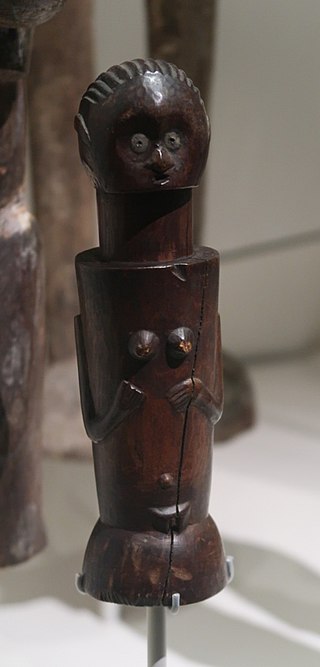Related Research Articles

Doe Maar was a Dutch pop band that combined punk, ska, and reggae influences. Formed in 1978, they broke up in 1984, reunited in 2000, and remained sporadically active from then until 2021, when their frontman, Henny Vrienten, died. They are considered to be one of the most successful pop bands in Dutch history. Throughout their career, the band released five studio albums, four live albums, ten compilations, and numerous singles.

Nederpop or Dutch pop music is pop music made by Dutch bands and artists.

John Doe (male) and Jane Doe (female) are multiple-use placeholder names that are used in the British and American legal system and aside generally in the United Kingdom and the United States when the true name of a person is unknown or is being intentionally concealed. In the context of law enforcement in the United States, such names are often used to refer to a corpse whose identity is unknown or cannot be confirmed. These names are also often used to refer to a hypothetical "everyman" in other contexts, like John Q. Public or "Joe Public". There are many variants to the above names, including John/Jane Roe, John/Jane Smith, John/Jane Bloggs, and Johnie/Janie Doe or just Baby Doe for children. A. N. Other is also a placeholder name, mainly used in the United Kingdom — which is gender neutral — along side Joe / Jo Bloggs and the now occasional use of the "John" and "Jane Doe" names.

The United States Department of Energy (DOE) is an executive department of the U.S. federal government that oversees U.S. national energy policy and energy production, the research and development of nuclear power, the military's nuclear weapons program, nuclear reactor production for the United States Navy, energy-related research, and energy conservation.

Seven is a 1995 American crime thriller film directed by David Fincher and written by Andrew Kevin Walker. It stars Brad Pitt and Morgan Freeman, with Gwyneth Paltrow and John C. McGinley in supporting roles. Set in an unnamed, crime-ridden city, Seven's narrative follows disenchanted, nearly retired Detective Lieutenant William Somerset (Freeman) and his newly transferred partner David Mills (Pitt) as they try to stop a serial killer from committing a series of murders based on the seven deadly sins.
The Krahn are an ethnic group of Liberia and Ivory Coast. This group belongs to the Kru language family and its people are sometimes referred to as the Wee, Guéré, Sapo, or Wobe. It is likely that Western contact with the Kru language is the primary reason for the development of these different names.
Doe, DoE, or DOE may refer to:
An SQL INSERT statement adds one or more records to any single table in a relational database.

The Office of Scientific and Technical Information (OSTI) is a component of the Office of Science within the U.S. Department of Energy (DOE). The Energy Policy Act PL 109–58, Section 982, called out the responsibility of OSTI: "The Secretary, through the Office of Scientific and Technical Information, shall maintain with the Department publicly available collections of scientific and technical information resulting from research, development, demonstration, and commercial applications activities supported by the Department."

The Doe Network is a non-profit organization of volunteers who work with law enforcement to connect missing persons cases with John/Jane Doe cases. They maintain a website about cold cases and unidentified persons, and work to match these with missing persons.
Mono is an indigenous language spoken by about 65,000 people in the northwestern corner of the Democratic Republic of the Congo. It is one of the Banda languages, a subbranch of the Ubangian branch of the Niger–Congo languages. It has five dialects: Bili, Bubanda, Mpaka, Galaba, and Kaga.

The New Jersey Department of Education administers state and federal aid programs affecting more than 1.4 million public and non-public elementary and secondary school children in the state of New Jersey. The department is headquartered in the Judge Robert L. Carter Building in Trenton.

The Doe are an ethnic and linguistic group based in northern coastal Tanzania, in the Bagamoyo District and Chalinze District of Pwani Region. In 1987 the Doe population was estimated to number 24,000.
This comparison of programming languages (associative arrays) compares the features of associative array data structures or array-lookup processing for over 40 computer programming languages.
The Northeast Coast Bantu languages are the Bantu languages spoken along the coast of Tanzania and Kenya, and including inland Tanzania as far as Dodoma. In Guthrie's geographic classification, they fall within Bantu zones G and E.
Zaramo is a Niger-Congo language, formerly primary language of the Zaramo people of eastern Tanzania. Zaramo is also known as Zalamo, Kizaramo, Dzalamo, Zaramu, Saramo and, Myagatwa. The language is critically endangered. The ethnic population of the Zaramo people reaches about 200,000, yet there are only a few elderly speakers remaining.
Doe Ching was a Chinese film director and screenwriter who worked in the cinema of Hong Kong.
New Bedford Public Schools (NBPS) is a school district serving New Bedford, Massachusetts, United States. Its headquarters are in the Paul Rodrigues Administration Building.
Jessie Little Doe Baird is a linguist known for her efforts to revive the Wampanoag (Wôpanâak) language. She received a MacArthur Fellowship in 2010. She founded the Wôpanâak Language Reclamation Project.

The Autopsy of Jane Doe is a 2016 supernatural horror film directed by André Øvredal. It stars Brian Cox and Emile Hirsch as father-and-son coroners who experience supernatural phenomena while examining the body of an unidentified woman. It is Øvredal's first English-language film. The film premiered at the Toronto International Film Festival on September 9, 2016, and IFC Midnight released it on December 21, 2016. It grossed $6 million at the box office. The critical consensus at Rotten Tomatoes calls it "a smart, suggestively creepy thriller".
References
- ↑ Doe at Ethnologue (25th ed., 2022)

- ↑ Jouni Filip Maho, 2009. New Updated Guthrie List Online